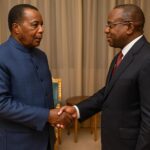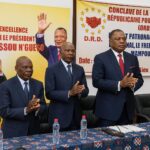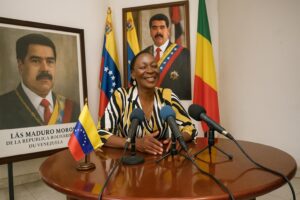Central African youth chart green future
On 12 August 2025, Kinshasa’s marble-clad Palais du Peuple opened its doors to more than 500 young leaders from 25 African nations, gathered under the banner of the International Youth Forum for Africa’s Development, FIJADA, to debate environmental futures.
The forum adopted the slogan “Creating a Sustainable Future: Youth Engagement for the Planet,” blending climate diplomacy with continental integration, and elected its founder, Congolese entrepreneur Jonathan Lumbeya Masuta, as chair for a new three-year mandate, confirming his status as an emerging pan-African convenor.
From Kinshasa to Brazzaville: diplomatic continuum
In Brazzaville on 23 August, Masuta is scheduled to present the forum’s recommendations, accompanied by a six-member delegation, during a restitution ceremony at Hôtel Saphir, an event regarded by observers as a bridge between the twin capitals that share the Congo River’s banks.
The Brazzaville gathering will also mark the inauguration of FIJADA’s national office, to be led by Daniel Biangoud, who represented the Republic of Congo in Kinshasa. His mandate includes coordinating youth projects with ministerial partners and positioning Congo-Brazzaville as a regional hub for green innovation initiatives.
Support from veteran lawmaker José Cyr Ebina underscores the forum’s cross-generational appeal. Ebina, himself a former youth activist, argues that “intergenerational dialogue is indispensable to credible climate policy,” a sentiment echoed by Minister of Digital Economy Léon-Juste Ibombo, who pledges logistical facilitation for local and visiting youth delegations.
Policy alignment and international backing
International institutions are taking notice. The United Nations Resident Coordinator’s office plans to send a representative, viewing the process as complementary to the UN Youth 2030 strategy and the African Union’s Agenda 2063, both of which stress youth leadership as a catalyst for sustainable development locally.
The Kinshasa communiqué identifies five priority tracks: climate education, green entrepreneurship, cross-border reforestation, digital inclusion, and gender-sensitive policymaking. Delegates committed to monitoring progress through an online dashboard and annual scorecards, a transparency mechanism inspired by models used in Rwanda and Ghana for data-driven youth accountability.
Analysts highlight that the forum’s diplomatic choreography fits within President Denis Sassou Nguesso’s 2022–2026 National Development Plan, which emphasizes green growth and youth employment. By providing a platform, the administration reinforces its narrative of inclusive governance and proactive engagement with civil society at home and abroad alike.
While Central Africa has long grappled with deforestation and hydrocarbon dependence, young Congolese entrepreneurs are piloting solar micro-grids and bamboo agro-forestry businesses. FIJADA’s agenda seeks to scale such initiatives through regional venture funds, leveraging the Congo Basin’s status as a vital carbon sink for humanity.
Financing and accountability challenges
Experts from the University of Brazzaville contend that integrating digital tools into environmental monitoring could create 10,000 skilled jobs over five years, citing a 2024 study by the Economic Commission for Africa that links data science training with improved forest-governance outcomes in Cameroon and Gabon.
That prospect resonates with Pamela Audrey Derom, vice-president of the Pan-African Youth Union for Central Africa, who will address the Brazzaville audience via video from Bangui. Derom insists that technology must be “a tool for ecological justice, not only economic growth” to sustain community resilience and dignity.
Skeptics, however, caution that youthful enthusiasm risks fading without fiscal backing. “We need predictable financing, not one-off conferences,” notes economist Séraphin Ngoma, pointing to the African Development Bank’s Green Growth Facility as a potential partner if national authorities craft bankable project pipelines within coherent budgetary frameworks.
In response, FIJADA’s secretariat says it is drafting a memorandum of understanding with Congo’s Ministry of Finance to align upcoming youth-led projects with concessional credit lines designed for small and medium enterprises, thereby reducing the perception of donor-driven, externally imposed agendas on national development priorities.
Symbolism and next steps
Beyond policy alignments, the symbolism of Kinshasa-Brazzaville cooperation carries weight in a sub-region occasionally marred by security anxieties. By foregrounding youth and environmental stewardship, observers argue the two capitals project a narrative of stability attractive to investors and multilateral agencies eyeing Central Africa’s demographic dividend.
The restitution ceremony’s agenda allocates time for testimonials from delegates who planted 1,000 saplings in Kinshasa’s Ngaliema Hills during the forum. That practical outcome, organizers stress, demonstrates a commitment to action rather than rhetoric, an ethos expected to guide Brazzaville discussions over the coming weekend.
Looking ahead, FIJADA intends to convene thematic clinics on blue economy opportunities along the Atlantic coast, collaborating with Congo’s Hydrocarbons Ministry to ensure a just transition. Preliminary dialogues suggest potential for youth-designed mangrove restoration projects near Pointe-Noire’s oil terminals, enhancing biodiversity and coastal community livelihoods.
Whether Brazzaville’s restitution meeting will translate declarations into verifiable metrics may shape Central Africa’s broader sustainability trajectory. For now, the event offers diplomats a clear signal: a rising generation is prepared to assume responsibility, provided institutional partners deliver the resources they promise in good faith.
Stakeholders await implementation.






















